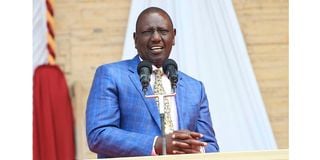Premium
President Ruto’s tough options in plan to audit the new curriculum

President William Ruto. The President made CBC a priority area in his inauguration speech when he announced that he would form a task force to collect views from Kenyans on the curriculum.
What you need to know:
- It is a race against time with limited resources and an impatient public that has failed to fully embrace the CBC since it was rolled out officially in 2019.
- President William Ruto made CBC a priority area in his inauguration speech when he announced that he would form a task force to collect views from Kenyans on the curriculum.
- The appointment of the working party has already drawn criticism from various interested groups who were lobbying for inclusion but were locked out.
While it was easier for Kenya Kwanza Alliance party honchos to bash the competency-based curriculum (CBC) as part of campaign rhetoric, the tough reality is that they are the government now and the fate of millions of Kenyan children is in their hands.
It is a race against time with limited resources and an impatient public that has failed to fully embrace the CBC since it was rolled out officially in 2019.
President William Ruto made CBC a priority area in his inauguration speech when he announced that he would form a task force to collect views from Kenyans on the curriculum.
He did so last week when he gazetted a Presidential Working Party to be chaired by Prof Raphael Munavu.
The Moi University vice-chancellor also led the team that drafted the Kenya Kwanza education charter.
One of the most urgent challenges is the first transition to junior secondary school in January. The new government has to grapple with a double intake of 1,250,000 Grade Seven and 1,320,000 Form One learners.
Many public secondary schools are congested and ill-equipped.
“The structure and financing present a challenge for CBC implementation. Capitation for Grade Seven (as secondary school learners) wasn’t factored in the current budget. It’s an area that has to be dealt with and it’s not practical as it is currently,” a Kenya Kwanza insider told the Nation on condition of anonymity.
The President has been cautious in his approach, although some of his lieutenants have been vocal in calling for CBC to be scrapped and the 8-4-4 system returned. His deputy Rigathi Gachagua waded into the matter two weeks ago in Kisumu City, announcing that CBC will only be reviewed and not scrapped.
Criticism
The appointment of the working party has already drawn criticism from various interested groups who were lobbying for inclusion but were locked out.
Despite publicly pleading to be considered for appointment, officials of teachers' unions have been left out. Dr Ruto’s team mainly comprises university dons.
He craftily avoided appointing representatives of interest groups like the Kenya Primary Schools Heads Association, Kenya Secondary Schools Heads Association and Kenya Private Schools Association.
A curious omission is that of the CEO of the Kenya Institute of Curriculum Development (KICD) despite the critical role it plays in curriculum review.
The working party also has no representative from the media fraternity.
Many of those appointed were involved in Dr Ruto’s campaign think-tank or are long-time associates, including his lecturers while at the University of Nairobi.
It is not lost on observers that Dr Ruto intends to effect changes at the Ministry of Education.
None of the serving five principal secretaries is in the working party. The President has also reduced departments at the ministry to three by doing away with the newest one specifically formed to oversee curriculum reforms and that of Post Skill Development.
Also missing is the Teachers Service Commission (TSC) chief executive, Ms Nancy Macharia. TSC is, however, represented by the director for quality assurance Dr Reuben Nthamburi Mugwuku.
“One major challenge for CBC has been lack of acceptance by all stakeholders. Parents have raised various issues yet they don’t have representation in the working party. Likewise, teachers are the implementers but are not represented. How will they embrace the reforms?” posed Jackie Kuria, a parent in Nairobi.
Ruto men
The man tasked with overseeing the review process is Education Cabinet nominee Ezekiel Machogu, if his appointment is approved by Parliament.
The career civil servant, who once served as a district officer and later district commissioner is a holder of a bachelor of arts degree from the University of Nairobi. He will take over from Prof George Magoha.
The terms of reference for the task force were developed based on the education charter Dr Ruto signed with education stakeholders ahead of the General Election.
“The two main issues to be dealt with have to do with the content of the curriculum and the structure of education and progression from one level to next,” a source revealed.
In the Kenya Kwanza education charter, Dr Ruto promised that his administration would “continue our robust engagement with the public to facilitate the assessment of the current curriculum and education structure towards finding a sustainable solution that will capture the essence of the knowledge-based system while integrating 21st-century skills, competencies and value-based education”.
It is, therefore, widely expected that the intended outcome will be a hybrid of CBC and the knowledge-based 8-4-4 system.
The charter “guarantees continuity of the learners without the interference of the learning process”, implicitly ruling out going back to 8-4-4.
After naming his Cabinet nominees, the President is now expected to name the principal secretaries.
Stakeholders in the education sector are anxious to find out the technocrats who will be appointed to head the various departments at the ministry.
The current officeholders were instrumental in the conceptualisation of the CBC. Whether the President retains the team or goes for new faces remains to be seen.





